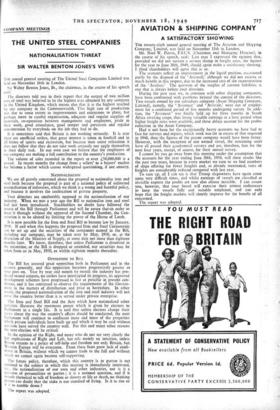A SATISFACTORY SHOWING THE twenty-sixth annual general meeting of The
Aviation and Shipping Company, Limited, was held on November 11th in London.
Mr. Noel W. Purvis, F.I.C.S. (Chairman and Managing Director), in the course of his speech, said: Last year I expressed the opinion that, provided we did not sustain a serious slump in freight rates, the figures for the year to June 30th, 1949, should again make a satisfactory showing. I think shareholders will agree this is so.
The accounts reflect an improvement in the liquid position, occasioned partly by the disposal of the Aviswell,' although we did not receive as much benefit in this respect, due to the increased cost of the reconstruction of the ' Avisbay.' The question of the surplus of current liabilities is one that is always before your directors. During the past year we, in common with other shipping companies, have been confronted with problems beyond the control of the directors. Two vessels owned by our subsidiary company (Ascot Shipping Company, Limited), namely, the Avismoat ' and Avisvalc,' were out of employ- ment for a combined period of five months undergoing survey. In addi- tion, the Avismoat ' was finally held up for three months in South Africa awaiting cargo, thus losing valuable earnings at a later period when higher freight rates were available, and these delays account for the profits reduction in the Ascot Company. Had it not been for the exceptionally heavy accounts we have had to face for surveys and repairs, which work was far in excess of that required in 1948, then the figures of the parent company would have been better. However, with the exception of one owned vessel, the remaining units have all passed their quadrennial surveys and arc, therefore, free for the next four years, except, of course, for their annual survey. I cannot let you go away from this meeting under the assumption that the accounts for the year ending June 30th, 1950, will show results like the past two years, because in every market we turn to .ve find numbers of ships offering for fewer freights and, as already mentioned, rates of freights are considerably reduced compared with last year. To sum up, all I can say is that Tramp shipowners have again come upon very difficult times, and whilst earnings of vessels are classified as invisible exports the profits are now also almost invisible. I can assure you, however, that your board will exercise their utmost endeavours to keep the vessels fully and suitably eitiployed, and can only hope that the freight markets will shortly improve for the benefit of all concerned.
The report was adopted.














































































 Previous page
Previous page